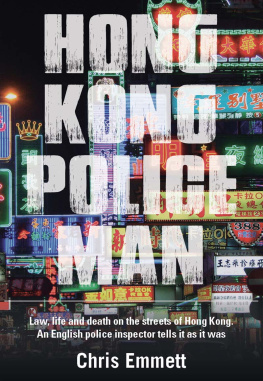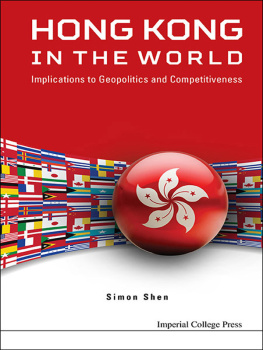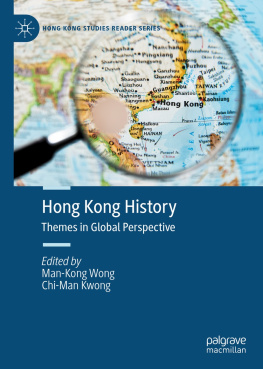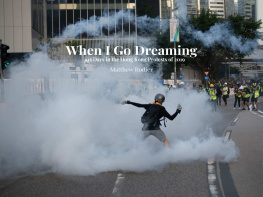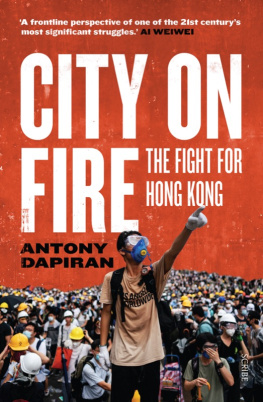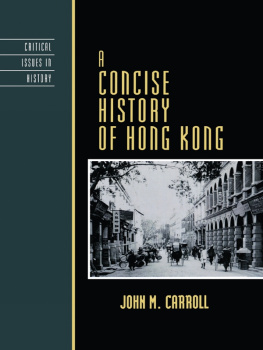
Adorjan and Chui offer a stunning perspective on Hong Kongs political responses to youth over time, and a compelling case study of the pressures that are brought to bear on a societys core understanding of young people. Not to be missed, this fascinating work is an important contribution to comparative criminology and youth justice.
Don Cipriani, Ph.D., author of Childrens Rights and the Minimum Age of Criminal Responsibility: A Global Perspective
Adorjan and Chui have not only provided us with an accessible scholarly analysis of youth crime and juvenile/youth justice in Hong Kong. They have also contributed to an evolving body of work from South-east Asia that opens new doors and significantly advances our understanding of comparative criminology.
Professor Barry Goldson, The University of Liverpool, UK
In Responding to Youth Crime in Hong Kong, Adorjan and Chui, through a careful examination of the key issues and debates on juvenile delinquency in different historical contexts, have given us an original and insightful analysis of institutional responses to youth delinquency and crime in Hong Kong. Their perceptive discussion of the historical structuration of state-society relations and the configuration of a penal elitist mode of governance points to a new set of research questions for future studies. This is a Hong Kong case study but the authors are able to relate their discussion to the broader concerns of comparative criminology, youth studies, social work, and sociological studies of deviance.
Professor Tai-lok Lui, The University of Hong Kong, Hong Kong
Responding to Youth Crime in Hong Kong
A societys response to youth crime reveals much about its broader cultural values, social circumstances, and political affairs. This book examines reactions and policy responses to youth delinquency and crime in Hong Kong during its colonial and post-colonial periods, and in doing so, underscores the history of Hong Kong itself and its present-day circumstances.
Exploring how officials have responded to youth crime in Hong Kong over time, this book tracks the emergence of a penal elitist mode of governance, highlighting concerns not only about young peoples behavior but the need for officials to establish state authority and promote citizen identification. In turn, it reveals an alternative to the usual story about youth crime found in many Western regions and provides an opportunity to begin to develop a comparative criminology. The book examines the emergence of the disciplinary welfare tariff during the 1970s, debates and policy changes related to the minimum age of criminal responsibility and youth sex crimes, and inaction regarding the introduction of restorative justice initiatives in the post-colonial era. It also addresses the power of post-1980s youth to protest and challenge government policies, which directly combats contemporary fears regarding the mainlandization of Hong Kong.
Drawing on archival sources, official reports and interviews with key stakeholders in the juvenile justice system, Responding to Youth Crime in Hong Kong will appeal to students and scholars interested in Chinese society, criminology, social work, sociology and youth studies.
Michael Adorjan is Assistant Professor in the Department of Sociology at the University of Calgary, Canada.
Wing Hong Chui is Associate Professor in the Department of Social Work and Social Administration and Associate Dean of Undergraduate Education, Faculty of Social Sciences at the University of Hong Kong.
Routledge Research on Public and Social Policy in Asia
Edited by M. Ramesh, National University of Singapore
1. Ultra-Low Fertility in Pacific Asia
Trends, causes and policy dilemmas
Edited by Gavin Jones, Paulin Tay-Straughan and Angelique Chan
2. Transforming Asian Governance
Rethinking assumptions, challenging practices
Edited by M. Ramesh and Scott Fritzen
3. Social Policy and Poverty in East Asia
The role of social security
Edited by James Midgley and Kwong-leung Tang
4. Grassroots Social Security in Asia
Mutual aid, microinsurance and social welfare
Edited by James Midgley and Mitsuhiko Hosaka
5. Higher Education in Southeast Asia
Blurring borders, changing balance
Anthony Welch
6. Managing Social Change and Social Policy in Greater China
Welfare regimes in transition
Edited by Ka Ho Mok and Maggie Lau
7. Responding to Youth Crime in Hong Kong
Penal elitism, legitimacy and citizenship
Michael Adorjan and Wing Hong Chui
Responding to Youth Crime in Hong Kong
Penal elitism, legitimacy and citizenship
Michael Adorjan and Wing Hong Chui
First published 2014
by Routledge
2 Park Square, Milton Park, Abingdon, Oxon OX14 4RN
and by Routledge
711 Third Avenue, New York, NY 10017
Routledge is an imprint of the Taylor & Francis Group, an informa business
2014 Michael Adorjan and Wing Hong Chui
The right of Michael Adorjan and Wing Hong Chui to be identified as authors of this work has been asserted by them in accordance with sections 77 and 78 of the Copyright, Designs and Patents Act 1988.
All rights reserved. No part of this book may be reprinted or reproduced or utilised in any form or by any electronic, mechanical, or other means, now known or hereafter invented, including photocopying and recording, or in any information storage or retrieval system, without permission in writing from the publishers.
Trademark notice: Product or corporate names may be trademarks or registered trademarks, and are used only for identification and explanation without intent to infringe.
British Library Cataloguing in Publication Data
A catalogue record for this book is available from the British Library
Library of Congress Cataloging in Publication Data
Adorjan, Michael.
Responding to youth crime in Hong Kong : penal elitism, legitimacy and citizenship / Michael Adorjan and Wing Hong Chui.
pages cm. (Routledge research on public and social policy in Asia ; 7)
Includes bibliographical references and index.
1. Juvenile delinquencyChinaHong Kong. 2. Juvenile correctionsChinaHong Kong. 3. Problem youthChinaHong Kong. I. Chui, Wing Hong. II. Title.
HV9213.A5A36 2014
364.36095125dc23
2013036103
ISBN: 978-0-415-81411-9 (hbk)
ISBN: 978-0-203-06764-2 (ebk)
Typeset in Times New Roman
by Taylor & Francis Books
To our families both immediate and extended
For April and Ashima
For Shirley and Adrian
Contents
The governance of childhood and youthparticularly the regulation of children and young people who offend adult sensibilities, transgress normative boundaries and/or breach the criminal lawcontinues to exercise governments and policy makers across the world, as it has done for decades. That said, the various means by which children and young people are governed and/or juvenile/youth justice is administered, are neither uniform nor static. Rather, both formal and informal modes of governance and regulation and, more specifically, the nature and shape of juvenile/youth justice systems, are characterized by ever-changing organizational forms and operational impulses. It follows, therefore, that policy responses and practice formations directed toward youth crime not only change over time (the temporal dimension), but they also vary between jurisdictions and, in some cases,


